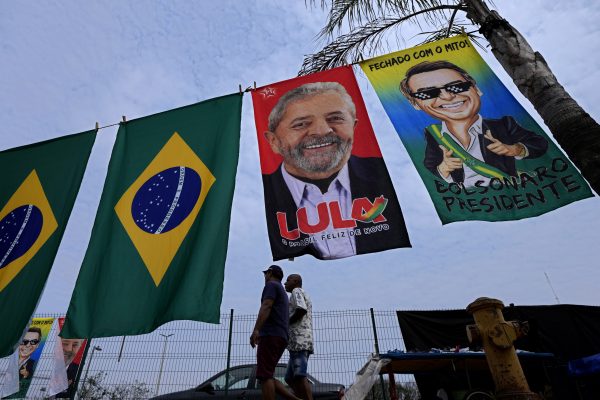“The elections this year will determine whom you serve. Bolsonaro is the only one capable of saving us from the Chinese communist domination agreed with Lula and the corrupt Workers’ Party.”
The paragraph above accompanied an amateur montage spread in Brazilian WhatsApp groups. In it, in addition to the apocalyptic prediction, are images of Luiz Inacio Lula da Silva, commonly known as Lula – the leading opposition candidate and favorite to win in Brazil’s elections against far-right Jair Bolsonaro on October 2 – shaking hands with Xi Jinping and Hu Jintao, the current and former Chinese presidents.
Despite the bizarreness, such a message would not have attracted attention in the last presidential election in 2018. After all, Jair Bolsonaro was known for his hawkish remarks against the communist country and even visited Taiwan when he was still running for office.
However, four years later, a message like this reveals something more profound: Just a week before Brazil’s historic elections, it is now clear that China has entered the domestic political debate, with uncertain consequences and repercussions for China’s relations not only with the largest South American country but with all of Latin America.
China Throughout The Ideological Spectrum
Strategies for dealing with China’s rise and its impact on local economies have been the subject of contention in the United States and Europe for years, if not decades. In Brazil, however, this is not the case.
Apart from rare mentions of Mercosur, Brazilian election campaigns are dominated mainly by domestic issues. This trend has been exacerbated by the increasing budget cuts in the Brazilian Ministry of Foreign Affairs, the controversial impeachment trial in 2015, and the economic chaos caused by the corruption cases in state-owned companies uncovered by Operation Car Wash. To illustrate how marginal Brazilian foreign relations are, not even a paragraph is devoted to them in Bolsonaro’s campaign promises for his next (and increasingly unlikely) term.
For the 2022 elections, some mention of China was expected by Bolsonaro’s supporters. The president, his allies, and even one of his sons frequently mentioned Beijing and eventually even got into a fight with the then-Chinese ambassador, Yang Wanming (after they accused China of covering up COVID-19 origins). Despite the strengthening of trade relations and Jair Bolsonaro’s visit to China in 2019, his tenure has been marked by unbridled contempt for the Chinese and their growing importance in Brazil.
China experts and observers, however, were initially surprised by the sharp statements made by even moderate candidates. Ciro Gomes, currently third in the polls and one of the prominent figures on the Brazilian left, was the first to attack. At a campaign event, Gomes declared that “they [the Chinese] have military artifacts in Venezuela, right next door, more effective than any deterrent structure of Brazilian defense aimed at Manaus because they have begun to distrust the follies of our Brazilian governance.”
Lula has followed suit. The international community largely remembers the former Brazilian president and current candidate for a third term as one of the most strident voices in defense of the so-called Global South. He was one of the main proponents of BRICS and the G-20, and he was the one in charge when China became Brazil’s leading trading partner in 2009, surpassing the United States.
Nevertheless, Lula did not spare criticism in his speech to Brazilian businesspeople at the São Paulo State Federation of Industry (Fiesp). “We have the illusion that China is occupying Africa, that China is occupying Latin America,” he said. “No, it is occupying Brazil. It is dominating Brazil.” Lula also praised his former vice president, the late José Alencar, who “was the only businessman who said ‘I am not afraid of China.’”
In his opinion, Beijing is to blame for the rapid deindustrialization seen in Brazil in recent years – rhetoric that has become popular in other countries around the world and previously reproduced by Bolsonaro himself, who in 2018 complained about China “buying Brazil, instead of buying from Brazil.”
When Lula joined in, it became clear that the debate on China had left the raucous bubbles of the far-right fueled by Bolsonaro and had become a topical part of the Brazilian political debate.
Prospects for China’s Relations With Brazil and Latin America
Both Lula and Ciro have tried to repair the damage – the former has told farmers he hoped to “restore relations with China in six months” if elected, while the latter even attended a meeting with Chinese embassy officials – but they also promise protectionist economic policies that are likely to make life difficult for Chinese investors in Brazil, no matter who wins the elections.
Brazil is facing a severe cycle of deindustrialization and has complained for years about China’s unwillingness to open up to Brazilian exports of higher value-added products (data from Brazil’s Ministry of Economy show that soybeans, iron ore, oil, beef, and cellulose accounted for 89.5 percent of all Brazilian exports to China in 2021). Local businesspeople complain about the few tariffs and regulatory barriers for Chinese products, especially with the emergence of e-commerce platforms like AliExpress in the country.
It makes little sense for Beijing to diversify its purchases from Brazil. Although Brazil was the main destination for Chinese investment in the world in 2021, especially in agriculture and power generation, the Chinese still see the country as an essential part of their food security strategy, not as a source of highly-developed products. Given the hostility of the Brazilian business community and the government’s consensus, Chinese officials are likely to feel even more compelled to accelerate their plans to reduce dependence on Brazilian commodities (particularly soybeans).
Preparations for this are underway. In its 2021 Five-Year Plan, China set minimum targets for national soybean production, requiring provinces to produce at least 650 million tonnes annually. The plan also includes belts for large-scale agriculture and the payment of massive subsidies to grain producers. The Chinese Ministry of Commerce, betting on the emergence of new acreage in the wake of climate change, has signed an agreement to pool soy production areas and build an industrial alliance with Russia, expecting to import at least 3.4 million tonnes from there by 2024; similar commitments have also been made with Ethiopia and Tanzania.
As sinologist Maurício Santoro, author of “Brazil-China Relations in the 21st Century: The Making of a Strategic Partnership,” points out, rising U.S. pressure against Beijing’s influence in Brazil and an increasingly hostile attitude toward the Chinese within Brazil could make China the scapegoat for structural problems in the local economy. The potential for weakening relations in the medium and long term should not be overlooked.
Since every crisis is followed by an opportunity, Argentina can benefit from a possible split. As the most prominent South American economy to integrate the Belt and Road Initiative, Buenos Aires already has Beijing’s explicit support to join BRICS if the group expands as the Russians and Chinese want. It is not impossible to imagine a scenario in which Argentina slowly fills the gap left by the cooling of Sino-Brazilian relations, even if its agriculture sector is much smaller, less diversified, and technologically inferior to that of Brazil.
In addition to trade and diplomatic problems, anti-China rhetoric could have unintended consequences in domestic politics. There is a notorious lack of expertise in Chinese studies in Brazil. There is not a single bachelor’s degree program in the field in the country, and the subject is often left out of traditional schools of international relations. Moreover, the number of Mandarin speakers is so low that it is not even counted by statistical offices.
Making one of Brazil’s most complex economic relationships the target of populist electoral discourse could lead to diplomatic incidents and ruptures that are difficult to repair with the Chinese. Examples abound; regardless of the motives, there is no denying the extent to which appealing to the electorate has eroded relations with China in countries such as the United States, the United Kingdom, and Australia, leaving little room for their normalization.
When the polls open on October 2, the world will be looking at Brazil and the possible results. China will be watching as closely as any country.











.jpg&h=630&w=1200&q=100&v=5f99a4b43f&c=1)









Discussion about this post